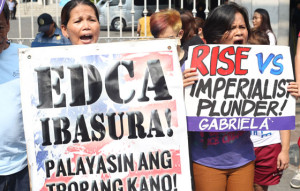THE Supreme Court (SC) on Tuesday upheld the constitutionality of the controversial Enhanced Defense Cooperation Agreement (EDCA) signed between the Philippines and the United States, finally putting to rest all questions on the legality of the accord.
Voting 10-4, the High Court gave credence to Malacañang’s argument that EDCA is an executive agreement, thus it need not be ratified by the Senate.
“As it is, EDCA is not constitutionally infirm. As an executive agreement, it remains consistent with existing laws and treaties that it purports to implement,” the tribunal said through a ruling written by Chief Justice Maria Lourdes Sereno.
It also upheld the President’s power to enter into executive pacts.
“No court can tell the President to desist from choosing an executive agreement over a treaty to embody an international agreement, unless the case falls squarely within Article XVIII, Section 25,” the court ruled.
“The President must be given a larger measure of authority and wider discretion, subject only to the least amount of checks and restrictions under the Constitution,” it said.
Only 14 justices voted since Associate Justice Francis Jardeleza recused himself because he handled the case when he was the Solicitor General.
Those who concurred with Sereno were Justices Antonio Carpio, Presbitero Velasco Jr., Diosdado Peralta, Lucas Bersamin, Mariano del Castillo, Jose Perez, Jose Mendoza, Bienvenido Reyes and Martin Villarama Jr.
Justices Teresita Leonardo-de Castro, Arturo Brion, Estela Perlas-Bernabe and Marvic Leonen dissented.
“The President’s choice of an executive agreement to contain EDCA places the burden on respondents to show that it is a mere implementation of existing laws and treaties concurred in by the Senate. On this, the court found that the burden had been discharged by the respondents,” the ruling said.
Petitioners in the case are former senators Rene Saguisag and Wigberto Tanada, Mary John Mananzan, University of the Philippines Professor Pacifico Agabin, Francisco Nemenzo, Harry Roque Jr. and Evalyn Ursua. The Bagong Alyansang Makabayan (Bayan) and party-list groups Gabriela, ACT Teachers, Anakpawis and Kabataan also challenged the constitutionality of EDCA.
Named respondents were President Benigno Aquino 3rd, Executive Secretary Paquito Ochoa Jr., Defense Secretary Voltaire Gazmin, Foreign Affairs Secretary Albert del Rosario, Budget Secretary Florencio Abad and the Armed Forces of the Philippines (AFP).
Since the voting was held on Tuesday, the High Court is expected to officially promulgate its decision next week.
Greater US presence
The US Embassy in Manila welcomed the verdict.
“EDCA is a mutually beneficial agreement that will enhance our ability to provide rapid humanitarian assistance and help build capacity for the Armed Forces of the Philippines,” the embassy said in a statement.
EDCA, a 10-year agreement signed in 2014, will see more US troops rotate through the Philippines for war games and help their hosts build military facilities.
It will pave the way for a greater presence of US forces in the former American colony as tensions simmer in the West Philippine Sea (South China Sea).
Aquino negotiated the accord to help the Philippines improve its military capabilities and draw the US closer, partly in a bid to counter a fast-expanding Chinese presence in disputed parts of the South China Sea.
US President Barack Obama also pushed hard for the defense agreement as part of his so-called strategic “pivot” to Asia that has involved expanding American military presence in the region.
The Philippines hosted two of the largest overseas US military bases until 1992, following a Philippine Senate vote to end their leases that was influenced by anti-US sentiment.
The EDCA agreement was signed in April 2014 as Obama visited Manila, when he said it would give US forces “greater access to Filipino facilities, airfields and ports, which would remain under the control of the Philippines.”
Filipino officials also previously said it would allow the United States to store equipment that could be used to mobilize American forces faster—particularly in cases of natural disasters such as the frequent typhoons that batter the archipelago nation.
The Philippines and the US are already bound by a mutual defense treaty signed in 1951 and a visiting forces agreement signed in 1998.
The first accord commits the United States to come to the aid of the Philippines in case of external aggression, while the second paved the way for US troops to engage in exercises in the Southeast Asian nation.
Armed Forces chief Gen. Hernando Iriberri said the SC decision bodes well for deepening the country’s defense with a key ally.
“As part of our shared goals with the US under this agreement, we look forward to further enhancing inter-operability, addressing short-term capability gaps, promoting long term modernization of our forces, helping maintain maritime security and maritime domain awareness and developing HADR [humanitarian assistance and disaster response] capabilities,” he added.
“These will redound to improving our capacity to perform our mandate to protect our people and secure the state,” Iriberri said.
Peter Paul Galvez, Department of National Defense (DND) spokesman, said the agency is looking forward to advancing the country’s defense modernization and strengthening maritime security and HADR capabilities.
“This puts us in a better position to improve our inte-operability with the US and increase our Armed Forces’ capacities,” he said.
WITH FERNAN MARASIGAN AND AFP


